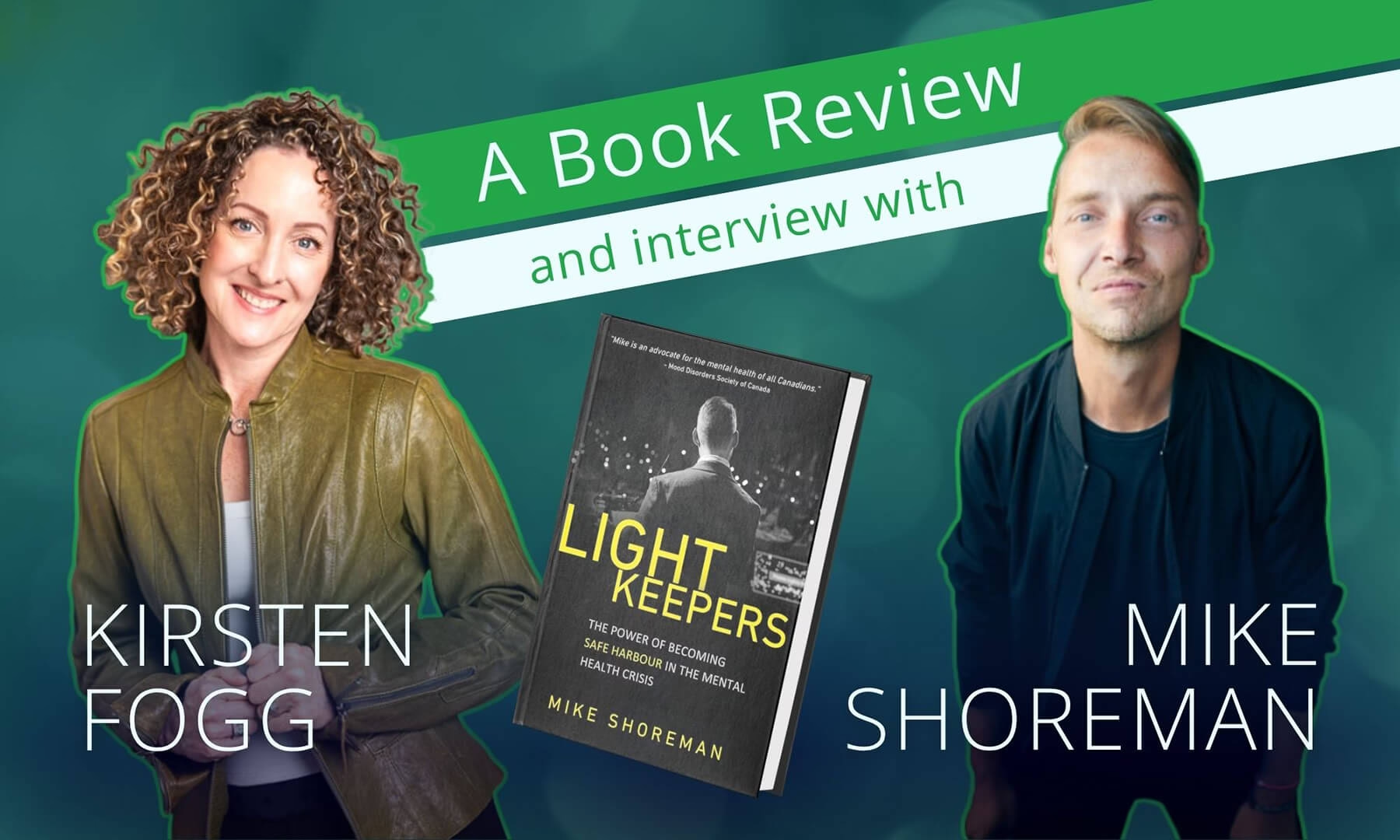Light Keepers: The Power of Becoming Safe Harbour in the Mental Health Crisis
by Mike Shoreman. (Entourage Media. 2024)
The first time I met Mike Shoreman, I spotted his tall frame crouched next to a woman in the audience at the 2024 Canadian Association for Suicide Prevention (CASP) conference. Here he was, the first Athlete with Disabilities to cross North America’s five Great Lakes on paddleboard, leaning in, listening and paying close attention to every word of this woman’s story. Then, when it was time, he slowly made his way to the front of the ballroom and launched into his keynote presentation.
I thought Mike was a seasoned speaker and I was impressed with how he made time for everyone who wanted to talk with him. I had no idea that this CASP conference was one of his dream moments. Or that he made it happen after a sudden neurological disorder upended his life.

From Success to Sudden Collapse
In 2018, Mike was in his early 30s, working hard and thriving. He had turned his love of paddle boarding into a business based on the shores of Toronto and he was planning on expanding to the Californian coast. But on the flight back from a Los Angeles business meeting, he noticed a headache. Over the following days he went from experiencing eye pain, fuzzy thinking and dizzy spells, to exhaustion and sharp pain in his ear that left him throwing up in the bathroom. He saw several doctors and was misdiagnosed even as he experienced increasingly severe nausea, vertigo and weakness, and even after he couldn’t move the left side of his face and his mother rushed him to emergency.
In this part of the story, his mother is his first Lightkeeper—the person who guides him to safe harbour—his father the second. With his worsening symptoms, and Mike barely able to walk, his mother refused to accept the diagnosis of ear infection. She pushed until she found a doctor who offered answers.

Losing Everything
By the time Mike was diagnosed with Ramsay Hunt Syndrome, a rare condition caused by the chicken pox virus, it was too late for medication to work effectively.
Mike’s symptoms worsened and he went from entrepreneur and athlete to being nursed by his parents, shuffled between appointments and his mother’s and father’s homes—just like he had when he was a child after they divorced. In weeks, he lost everything. His home, his business, his physical and mental health, his independence, and his dreams. At his lowest point, he attempted suicide.

Lightkeepers: A Message of Hope
Mike, who now works towards dismantling stigma and systemic barriers and donates to community causes, shares his story in an approachable and accessible voice. The reader is drawn in by his brutal honesty and by the raft of emotions we feel with him. His story also shows us how quickly our lives, and our mental health, can change. It’s a reminder that none of us are immune. That’s why we need a team of Lightkeepers to guide us to safety when we are most vulnerable. And that’s why we need to step up and be Lightkeepers ourselves when our own mental health is strong.
While Mike loses hope at this point in the memoir, the reader never does. We keep turning the pages because we need to see how Mike transforms himself, with the help of his parents, medical professionals, and eventually a team of friends and strangers, into a dynamic keynote and TEDx speaker.

Paddleboarding for a Purpose
As a paddleboarder and a suicide loss survivor, I was inspired by Mike’s tenacious efforts to make change. When the pandemic struck in 2020, isolating people and cancelling events, Mike didn’t give up. He devised a plan to paddleboard across Lake Ontario to raise awareness and funds for Jack.org, a Canadian mental health organisation for youth.
“I wanted to show and inspire people to believe that no matter how dark things got there was always a way forward,” he writes. I wanted to plan “a story of resilience and hope.”

Rejection and Resolve
That year, Mike spent his free time contacting businesses for support and receiving rejection after rejection. He was out on Lake Ontario in February training next to ice blocks and, as the August crossing grew closer, Mike did interviews and public appearances, often forgetting to eat. His first attempt to cross the smallest of the Great Lakes was a devastating failure.
Most people would have given up at this point. I think I might have. As a writer, I face repeated rejections for my work. It’s part of the job and it’s hard. But here’s Mike, trying to pull together crews and support to raise money for a good cause—for youth mental health—and still people are ignoring or rejecting his requests. Reading Light Keepers motivated me because it showed me just how much perseverance we need to realize our dreams, our purpose and our potential.

Pushing Through: Five Great Lakes
Mike rallies, learns from his failure and makes a new plan to cross all five Great Lakes in one summer. With growing anticipation, he takes the reader through learning from his failure to his meticulous planning, training and team building for the lake crossings.
And the lakes were ready for the challenge. As Mike paddles alongside his team boat—sunburnt through five-foot swells, peeing in his wetsuit during the day and trying to stay awake and not give in to exhaustion at night—each lake ups the ante. I found myself cheering for Mike and his teams, thankful for strangers who volunteered their boats and time, overwhelmed with gratitude to the ship captain who moved his 800-metre “laker” so Mike could stay on course. Each crossing mirrored Mike’s earlier mental health struggles and his team helped him through.

Lightkeepers is an Uplifting Call to Action
Lightkeepers is a quick, compelling and uplifting read. It’s a page turner that will validate the efforts you’re making to support a loved one and to change the way mental health and mental illness are treated or viewed. For families, friends, and caretakers of children, youth or young adults living with mental health issues or mental illness, Lightkeepers will help you feel less alone and give you the strength to keep going.
Lightkeepers is an inspirational and motivational read with lots of reality in between.

Q&A with Mike Shoreman
1. What was your writing process?
MS: “The story of writing Lightkeepers came from a combination of journaling through the crossings of 2021 and 2022 and post-experience reflection. In 2022 and 2023 the research of the history of Canadian mental health and the Great Lakes and the writing process began. Research on history, language, and policy was extensive. The editing process [two rounds of edits] concluded in the summer of 2024 before the book was released in October 2024.”
2. People often think writing is cathartic and healing. They forget that writers must relive everything to get the story down. What did you do to keep writing and not get re-traumatized?
MS: “Writing can be cathartic and healing and so can oral communication—that doesn’t mean we don’t feel or have moments that bring up past trauma or wounds. Writing the experience of the breakdown and how it impacted my loved ones was difficult. I did not write that in one sitting or even in a week or a month. I stepped away and processed what it was bringing up for me emotionally and psychologically and then returned when it had settled. My publisher and the editors were incredible supports through the writing process.”
3. Did writing the book help you process your overall journey?
MS: “Writing the book allowed me to sit down and go through the good and bad and digest the events in a healthy way that I wouldn’t have had otherwise. It pushed me to confront some of the challenges and unresolved issues from that journey and to move forward intentionally in a way that I didn’t know I needed and in a healthy way too. There was forgiveness for others and even for myself.”
4. How do you look after yourself now?
MS: “I am fortunate enough to be surrounded by an incredible support system and great people who keep me grounded and supported. Working in mental health education can be taxing emotionally, so it’s important to have outlets for stress. I enjoy paddleboarding of course and activities that help me cope and manage my day to day. Mindfulness activities like doing the dishes—feeling the sensations of the water and being still in the present moment—bring me into the moment and help separate past and future times of stress and worry. It’s a simple but effective grounding technique.”

Kirsten Fogg | Friend of Eli's Place
Kirsten Fogg is an Australian Canadian award-winning essayist, writer and public speaker who has been shaped by living in France, England, Australia and Canada and by the suicide of her teenage brother. She believes in the power of words to heal and the power of story to change lives. Kirsten’s publication credits include The New York Times, Chatelaine, The Toronto Star, The Chicago Tribune, The Globe and Mail and others. Kirsten holds an MFA in Creative Nonfiction from the University of King’s College and facilitates writing workshops for grounding and healing. She’s working on her first book, a memoir about long-term healing from suicide loss.
- Kirsten Fogg | Friend of Eli's PlaceJune 17, 2024





